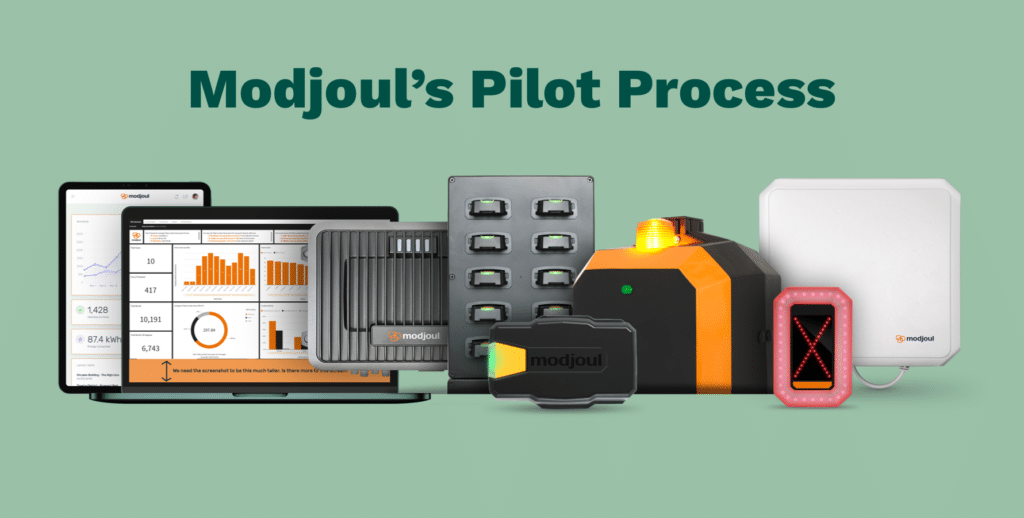History of Modjoul
Modjoul is celebrating its 7th year in operation this month. From a startup housed above a pizza shop to a company with clients from coast to coast, it has been a fast-paced ride.
We took some time to look back with CEO Eric Martinez and COO Jen Thorson, Modjoul’s co-founders, on the past seven years and look ahead to what’s next for the company.
Question: Seven years in, Modjoul is still growing and evolving. At the same time, it has moved well beyond the brand-new startup phase. What do you think about when you think back to Modjoul’s early days?
Eric Martinez: We were a company of immigrants when we started. There were five immigrants, Jen and I. We hired some very talented people who had H1B visas who wanted to stay in the United States. We kind of chaperoned them into becoming U.S. citizens. If the company had failed before that process was completed, they would have had to move to Canada. And if it had failed for Jen and I, we would have had to move back to the corporate world. None of us wanted that outcome.
Jen Thorson: We were a gritty, boot-strapping organization for years. We still maintain that culture, but it totally defined our approach to everything in those first few years. Everyone had to be willing to jump in and do anything and everything that needed to be done.
EM: I would also add that, if you’re lucky and you have a good idea, you have a lot of hands on your back when you start a company. The friendship we have with Clemson University was and remains critical. Our big question when we started was how do you find four great engineers to start the company? They had to be technically good, but we had no way to get the top of the class at Clemson. The engineering school really helped us find some really good people. We couldn’t have done it without them.
Q: In addition to finding the right people and talent, could you point to one or two other key factors to getting Modjoul to this point?
JT: We have always been 100 percent client-focused. To the point where there is no hesitation to responding to a customer and doing everything we can to make sure they know we’re thinking about them and that they’re our number one priority.
EM: There is nothing we won’t do for our customer, whether in responsiveness or trying to solve their problems. We treat leads and customers as dragon’s teeth because know how hard it is to get them.
Q: A lot of companies talk about being a team, about the cross-pollination of ideas and the like. What does that look like at Modjoul?
EM: We have a strong belief that none of us is smarter than all of us. Whether we are trying to solve a customer problem or a technical problem, we take a full-team approach and everyone brings a unique perspective in solving it. Everyone brings an area of expertise and that creates good overlap.
Q: What do you look for when you add to your team? Beyond technical expertise?
JT: A lot of things, but the main thing is a strong drive and work ethic. If you’re willing to work hard, you’ll do alright here. If you just want to come in and stir the pot, you’re going to have a hard time.
EM: That, and I would add that the core of our company is our intellectual curiosity. We really look for intellectually curious people. People who want to understand problems on a deep level, and then are obsessed about solving them.
Q: Speaking of problem-solving, you do that for your clients today. But didn’t most of that involve your own product in the early days of Modjoul?
JT: Yes. I would say we probably solved more problems in the first 6 months with our product than we’ve ever solved since.
Q: Can you share more about that?
JT: Our wearable had seven times the number of sensors it has now. We thought more was better. But it was a mess. We both had gone to visit clients or potential clients with electrical tape holding the wearable together.
EM: But our clients wanted us to succeed. We had several who said basically “I like your purpose, I like what you’re doing. Your product needs a lot of work, but maybe we can help you get better. Instead of laughing us out of the room, which they should have done, they helped us. They asked us “Why don’t you try this?” It was really remarkable looking back on it.
Q: Did you have a sense your first prototype wasn’t ready for prime time, so to speak?
JT: Yes, but you have to do that as a startup because if you wait until the product is perfect, you will miss the opportunity. The key is to innovate faster. We still ask ourselves that question every day: How can we innovate faster?
EM: And that today is our biggest growing pain. How do we hold onto our entrepreneurial, problem-solving, customer-focused culture as we grow and new people come into the company? We have to continue to reinforce that the priority is we’ve just got to solve problems for our clients. I don’t care who owns the silo. A big company can get mired down in decision-making. When you work in a small company, everyone has ability to make decision. It helps being agile — there is no “Mother may I?” layer to solve problems.
If you would like an assessment of your workplace risks or to see a demo of any of our solutions, we would love to start a conversation with you. Complete the form below and one of our client strategy and solutions experts will be right back in touch!




